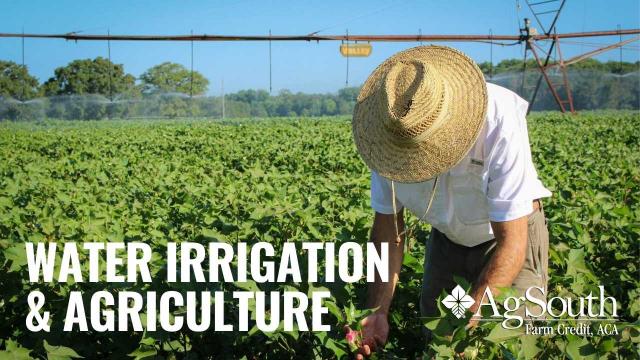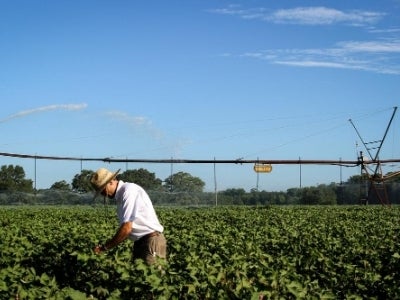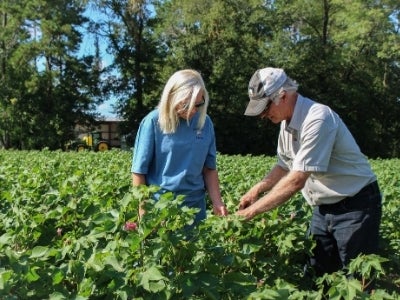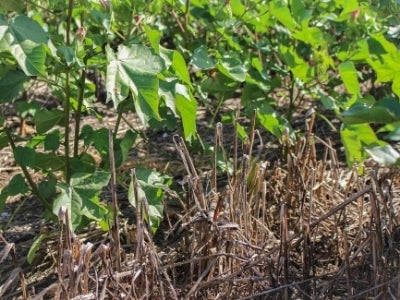Water Irrigation and Agriculture

Why do farmers irrigate and what are cover crops? We interviewed two Georgia farmers about water use and got answers to some commonly asked questions.
In this article:
- Why do farmers irrigate?
- Are there negative impacts?
- How much water do farmers use?
- How do they know when to irrigate?
- How can farmers change how they grow to conserve water?
Let's Talk: Water Use on The Farm
Have you ever seen an irrigation pivot (the gigantic sprinkler) watering crops on a farm and thought all that water might be going to waste? Or maybe you’ve seen a field with wilting plants in 100 degrees fahrenheit heat and wondered why the farmer wasn’t irrigating?
If you’re not familiar with how and why irrigation is used on a farm, it can be a little confusing to understand why one farmer was using more water than the other in the scenarios above. So, let’s talk about water usage on farms and dive deeper into some commonly asked questions!
Why do farmers irrigate?
Watering a crop could be compared to watering your garden, only on a much, much larger scale. If your tomato plants get no water for 3-4 weeks, will they keep producing tomatoes? Most likely not! A crop that doesn’t get water over a long period will also stop producing peanuts, corn, cotton, etc.
Irrigation is used to give plants the water they need when they need it. Watering controls the moisture level of the soil, which maintains the growth of the crop as well as the overall quality. Bill Tyson, the Agriculture Extension Agent in Bulloch County, Georgia says, “We’re never more than two weeks away from a drought, so irrigation allows the farmer to keep the crop progressing during hot, dry times.”
Rainfall is notoriously inconsistent, so irrigation gives the farmer the ability to have some control over that. If your grass or garden needs more water than the rain provides, it makes sense that crops might need more water too!
What about the negative impacts?
There is a substantial cost to irrigating, both economically and environmentally. Every time a farmer turns on their irrigation system, they pay for it. It costs money to run the electricity to irrigate, which is why farmers who use irrigation only water their crops when absolutely necessary or they only have irrigation on a portion of their land. Farmers can’t afford to water more than needed. They are also well aware of the environmental impact of drawing out groundwater, so are careful to only water when needed.
“If we’re not being good stewards of the land, we’re not going to be in business very long,” said David Cromley, a cotton and peanut farmer in Brooklet, Georgia. Farmers take care of the land so that they can keep farming and growing food for the rest of the world.

How much water do farmers use to irrigate?
The amount of water a farmer uses depends on the weather, the crop, and the individual farmer. Fruit and vegetable crops need more water than row crops, such as cotton or peanuts. Some years, it rains enough and at the right times so a farmer will only have to run the irrigation system a couple of times. Other years, it might be extra hot and dry, meaning a farmer might need to water their crops weekly.
Some crops require more water at different growing stages, such as when the plants are making their fruit. Even during times when a farmer might be irrigating more than normal, they are still aware of the potential negative impacts. It saves a farmer money to not run their irrigation system, so the less they have to use it, the better (for them and the environment!).
How do farmers know when and how to irrigate?
Similar to how you know when to water your tomato garden, farmers know what stage of growth their crop is in and how much water it needs at that time – and that is based on years and years of scientific research on what crops need to be most productive! They don’t just stick their finger in the soil to measure the moisture level, farmers use technology and/or irrigation schedules to predict when they need to water their crops. As these tools continue to improve, it is easier for a farmer to know when and how much water to use.
David uses irrigation on only about 20% of his farmland. A few years ago, he began working with various researchers using soil moisture sensors and meters to help him know when to irrigate his crops. “I’m able to water the plant before it starts to stress and wilt. Watering at the right time allows you to get the most effect out of your irrigation,” he said. “I am able to know exactly how much water is in the soil without having to guess.”
How can farmers change how they grow their crops to conserve water?
There are several ways to reduce the crop’s dependency on rainfall. Planting a “cover crop” between the seasons of the main crops is considered one of the best ways to increase the organic matter in the soil and protect the main crop from drought. A cover crop is usually planted in the winter (oats and wheat here in the south) and allowed to mature to a certain point. Then, the main crop (cotton, peanuts, corn, etc.) is planted into stalks remaining in the field from the cover crop. So, the farmer isn’t planting on bare soil.
Clayton Anderson, a cotton, peanut, and corn farmer in Register, Georgia, is passionate about his use of cover crops. He farms roughly 1,200 acres and plants a cover crop in every one of his fields.

There are many benefits to planting a cover crop, especially to Clayton, who doesn’t use any irrigation. “The cover crop allows the sandy soils to stay cooler and hold what moisture we get from rain longer,” he said.

Farmers who plant cover crops and irrigate reap the same benefits—they can retain more water in the soil and irrigate less. Cover crops also prevent water runoff and erosion because the roots of the plant hold the soil in place during heavy rainfall or a windstorm. In summary, cover crops save water and improve the soil!
There are so many ways that farmers are conserving water and efficiently irrigating. Clayton says it best, “Everything is all about the water. Without water, there are no crops.”
Questions?
We hope this information is helpful in learning about water use and agriculture. If you're looking to purchase land, farms, or homes in Georgia, North Carolina, or South Carolina one of our loan officers would be more than happy to help. Find an AgSouth Branch near you!
Not in Georgia, North Carolina, or South Carolina? Find your Farm Credit Association.